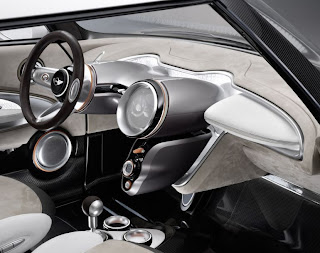In creating the Rocketman, Mini's main focus was to keep its petite body as light as possible.
A carbon spaceframe makes up the main construction, and things like weight-saving wheels
with an enclosed surface structure reduce drag to improve fuel economy.
Speaking of economy, Mini says that the Rocketman is powered by "a drive system which
combines further enhanced sprinting ability with average fuel consumption of just three liters
per 100 kilometers (94 miles per gallon Imperial)" – about 78 mpg on the U.S. cycle. We
don't have details about what exactly powers the Mini concept, but we'd bet our bottom
dollar that there's some electrification involved.
A carbon spaceframe makes up the main construction, and things like weight-saving wheels
with an enclosed surface structure reduce drag to improve fuel economy.
Speaking of economy, Mini says that the Rocketman is powered by "a drive system which
combines further enhanced sprinting ability with average fuel consumption of just three liters
per 100 kilometers (94 miles per gallon Imperial)" – about 78 mpg on the U.S. cycle. We
don't have details about what exactly powers the Mini concept, but we'd bet our bottom
dollar that there's some electrification involved.
It’s just 3.2m long (that’s 11ft 3in to the original Mini’s 10ft) and 1.9m wide (6ft 3in) wide.
The rear cabin space is very restricted until the front passenger seat is slid forward,
allowing the rear seat behind it to be used. There’s also a basic seat base moulded in
carbonfibre behind the driver’s seat, which would allow a fourth passenger to squeeze
into the Rocketman for very short journeys.











































No comments:
Post a Comment